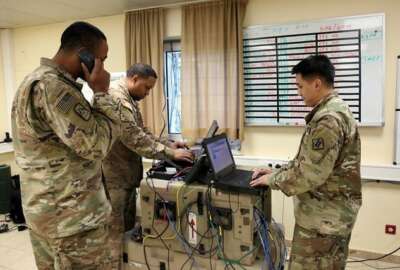Small companies may get some new incentives to work with the Army and use the service’s labs for research.
Assistant Army Secretary for Acquisition, Technology and Logistics Bruce Jette says he’d like to subsidize travel expenses for some businesses so they can use the equipment in the Army laboratories for their work.
“What we are trying to do is knock down some of those barriers,” Jette said Tuesday during the NDIA Army S&T Conference in Washington. “We haven’t finalized it yet, but there may be a way we can do invitational travel just like in cooperative research and development agreements. What I want to do is make sure we don’t eliminate your participation because of things like travel. It’s really for small business.”
Cooperative research and development agreements (CRADAs) are formal agreements between one or more federal laboratories and one or more non-federal parties under which the government and the non-federal party jointly provide personnel, facilities, equipment or other resources to conduct specific research or development efforts that are consistent with the mission of the laboratory.
Jette hopes to create connections with small businesses through unofficial agreements that allow them to visit the labs, work and use facilities and equipment.
Jette’s plan is part of a larger push from the labs and the Army as a whole to engage more with small businesses.
Army Vice Chief of Staff Gen. James McConville said the Army is open to any and all businesses as it begins building up its Army Futures Command, which will completely overhaul the service’s acquisition process.
In 2014, the labs created the Open Campus Business Model, which started the collaboration between industry and the Army at the labs. The model allows the Army to enter into CRADAs and educational partnerships.
“The Open Campus business model is really about building this network of the best and the brightest so that when we need them, we build a relationship with them and build a trusted relationship so when we do need them to solve very challenging Army problems, we know who to go to,” said Karl Kappra, chief of the ARL’s office of strategy management in an Aug. 9 press release. “We don’t know what we don’t know when we talk to these people and they’re there to tell us what their ideas are and we’re there to help them grow those ideas. These are all in the vein of looking for, to reach out to companies and looking for disruptive technologies.”
The Army wants that concept along with the possible subsidies to branch out to smaller, nontraditional defense companies and institutions.
Intellectual property
In another nod to small and nontraditional businesses, Jette said the Army is still working on a new intellectual property policy.
“It’s still being scrubbed. It’s got to be scrubbed against the laws; it’s got to be scrubbed against the Federal Acquisition Regulation. It’s got to be scrubbed against the Defense Federal Acquisition Regulation Supplement. It’s got to be scrubbed against policy,” Jette said.
Jette’s IP plan encourages more dialogue with industry before contracts are signed and during the development process. Part of dialogue means signing nondisclosure agreements so companies can talk openly with the government.
It also involves creating clear lines of demarcation between the portions of technology that have been paid for by the government and those over which the vendor will continue to hold exclusive rights.
Jette said this may bring in smaller, nontraditional companies because they don’t have ownership over anything but their ideas. Therefore, they are more reluctant to share their ideas with the government without a promise.
He said in the past the Army was locked into working with a company because the service paid for the development idea. The government was then stuck with companies that went belly up or were sold to different companies.
“That’s not how commercial works and you all know that. We are going toward the commercial way of doing things,” Jette said.
Jette thinks licensing will be a better option for the Army.
“Show me the box. That’s your IP,” he said, describing the negotiation process. “Put that in the bid, show me what the limits of that is, and show me the functionality. I don’t want to know what’s in the box: that’s yours. So tell me what you want to do for licensing. Do you maintain it? Do you want me to maintain it? Then, I’m going to design the box that goes next to it and interfaces with it. If I pay for it, I own it. If you pay for it, you own it,” Jette said in a previous speech in April.
Copyright
© 2024 Federal News Network. All rights reserved. This website is not intended for users located within the European Economic Area.

